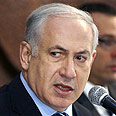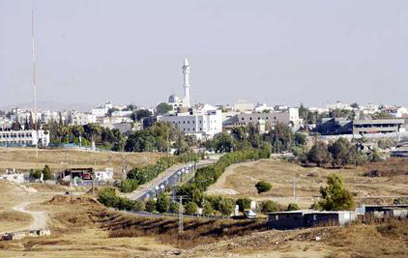
Negev's Bedouins tired of empty promises
Residents of dozens of unrecognized Bedouin villages in southern Israel unimpressed by government's repeated promises to amend infrastructural neglect plaguing their communities
The government's ministers may have visited the Negev on Sunday and promised, yet again, to do what they can to turn the desert into an oasis, but the tens of thousands of Bedouins living in the area have no intention of holding their breath.
Members of the communities making up the Regional Council of Unrecognized Villages (RCUV) – an independent body which represents some 80,000 residents of the Negev's unrecognized Bedouin villages – are used to empty promises. They are still living in communities lacking proper health and educational infrastructure, and they are still waiting for state authorities to recognize their plight.
According to RCVU data, the vast majority of Bedouin villages in the Negev have irregular supply of water and power, and poor health and educational services – if any.
A recent report by Physicians for Human Rights found that the residents of these villages have but one doctor for every 3,116 people. Moreover, at least 34 of the Bedouin communities have no medical services whatsoever.

Rahat. Only seemingly modern (Photo: GPO)
Ibrahim Abu Apash, 56, is a resident of the village of Wadi el-Naam, which is located near the south's Ramat Hovav industrial zone. The unrecognized village has no medical services, and according to Abu Apash, "We have no real roads, so if it rains we can't go out of the village."
He is convinced that if the ministers ever visit the village and witness the conditions its residents live under, they will immediately do something about it, but he does not believe they will make the trip: The Goldberg Committee, he said, filed its recommendations, but none of them were implemented.
The Goldberg Committee was a government-appointed commission headed by retired Supreme Court Justice Eliezer Goldberg and tasked with probing the circumstances of the unrecognized Bedouin villages in the Negev area. It filed its recommendations with the Construction and Housing Ministry in December 2008, and urged the state to recognize 46 villages.
'Islamic Movement exploits the vacuum'
Mhmad Abu Judah of the village of Azarur, near Tel Arad, told Ynet that he and his neighbors could no longer live without basic infrastructure: "We have no electricity. The village only has one generator. We don’t have enough water – the entire village uses one pipe and we all fill tankers from it. It's hard."
Rahat, Israel's only Bedouin city, does not fare much better, since it too lacks solid infrastructure. According to Mayor Faiz Abu Sahiban, the city is plagued by a negative image, which makes it hard for it to develop further.

No water, no power. Unrecognized Bedouin villages (Photo: Herzel Yosef)
According to the Abu Sahiban, one example of the hurdles the city has to deal with is the fact that it has no ATM machine – residents who need cash must go to neighboring Beersheba. The latest novelty to reach Rahat, he added, is inner-city public transportation.
Abdullah Abu Shriki, who heads the social welfare department for the Kuseife Local Council in the Negev, said that the hardships the Bedouins face leads to feelings of alienation among many of them.
"Just recently, an officer who was just released from the army came to see me. He and his family had no place to live. Another soldier for the IDF's trackers unit came to me with the same problem this week. I told them to call the Defense Ministry, but no solution has been found yet. How are they supposed to feel?"
Abu Shriki feels that better education could go a long way towards finding a solution: "In the Bedouin sector, if you can't get into a university, you become a teacher. The result is… that the children are not given a proper education and they cannot advance in life.
"We can't afford any summer programs, so the Islamic Movement takes advantage of the vacuum and offers them, like Shas."
Nevertheless, Abu Shriki does not feel that the problem stems from racist government policies. The Bedouin communities, he said, simply have no one to lobby for them, "and only a few try – and in vain."










